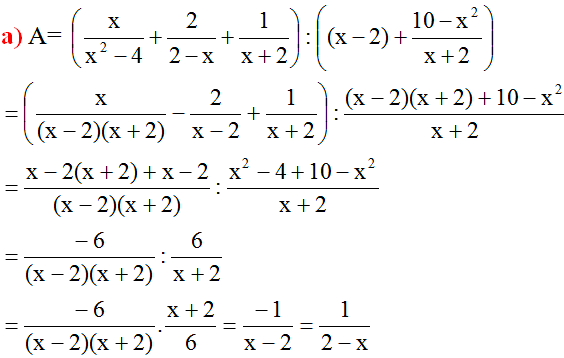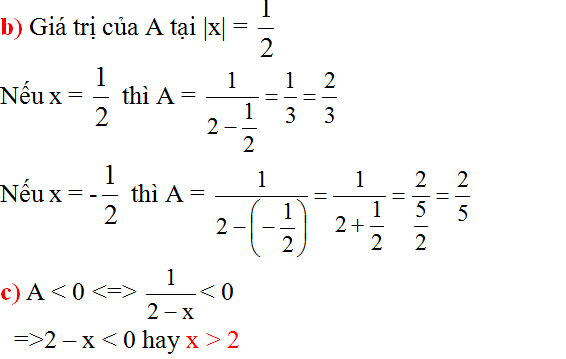Hãy nhập câu hỏi của bạn vào đây, nếu là tài khoản VIP, bạn sẽ được ưu tiên trả lời.

a) ĐKXĐ: \(x\ne1\)
b) \(A=\frac{2}{x-1}+\frac{2\left(x+1\right)}{x^2+x+1}+\frac{x^2-10x+3}{x^3-1}\)
\(=\frac{2\left(x^2+x+1\right)}{\left(x-1\right)\left(x^2+x+1\right)}+\frac{2\left(x+1\right)\left(x-1\right)}{\left(x-1\right)\left(x^2+x+1\right)}+\frac{x^2-10x+3}{\left(x-1\right)\left(x^2+x+1\right)}\)
\(=\frac{2x^2+2x+2}{\left(x-1\right)\left(x^2+x+1\right)}+\frac{2x^2-2}{\left(x-1\right)\left(x^2+x+1\right)}+\frac{x^2-10x+3}{\left(x-1\right)\left(x^2+x+1\right)}\)
\(=\frac{5x^2-8x+3}{\left(x-1\right)\left(x^2+x+1\right)}=\frac{\left(x-1\right)\left(5x-3\right)}{\left(x-1\right)\left(x^2+x+1\right)}=\frac{5x-3}{x^2+x+1}\)

Bài 3:
a: DKDXĐ: x<>1
b: \(=\dfrac{x^2+2+x^2-x-x^2-x-1}{\left(x-1\right)\left(x^2+x+1\right)}\cdot\dfrac{2}{x-1}=\dfrac{x^2-2x+1}{\left(x-1\right)^2}\cdot\dfrac{2}{x^2+x+1}=\dfrac{2}{x^2+x+1}\)
c: Để C lớn nhất thì \(A=x^2+x+1_{MIN}\)
\(=\left(x+\dfrac{1}{2}\right)^2+\dfrac{3}{4}>=\dfrac{3}{4}\)
Dấu = xảy ra khi x=-1/2

a/ (1+x2).(1+x)
b/A=\(\dfrac{-68}{27}\)
c/x>-1 và x2 >1
phần giải tự lm nhé
Lời giải:
a) ĐKXĐ: \(x\neq \pm 1\)
Ta có: \(A=\left(\frac{1-x^3}{1-x}-x\right):\frac{1-x^2}{1-x-x^2+x^3}\)
\(=\left(\frac{(1-x)(1+x+x^2)}{1-x}-x\right): \frac{1-x^2}{(1-x)-x^2(1-x)}\)
\(=(1+x+x^2-x):\frac{1-x^2}{(1-x)(1-x^2)}=(1+x^2):\frac{1}{1-x}=(x^2+1)(1-x)\)
b) Tại \(x=-1\frac{2}{3}=\frac{-5}{3}\Rightarrow A=(\frac{25}{9}+1)(1-\frac{-5}{3})=\frac{272}{27}\)
c) Để \(A=(x^2+1)(1-x)>0\)
\(\Rightarrow 1-x>0\) (do \(x^2+1>0\) )
\(\Rightarrow x< 1\)
Vậy \(x<1; x\neq -1\)

Lời giải của bạn Nhật Linh đúng rồi, tuy nhiên cần thêm điều kiện để A có nghĩa: \(x\ne\pm2\)

\(A=\left(\dfrac{1}{\left(x+1\right)\left(x^2-x+1\right)}+\dfrac{6x+3}{\left(x+1\right)\left(x^2-x+1\right)}-\dfrac{2\left(x+1\right)}{\left(x+1\right)\left(x^2-x+1\right)}\right):\left(x+2\right)\)\(A=\dfrac{\left(x+1\right)\left(x+2\right)}{\left(x+1\right)\left(x^2-x+1\right)\left(x+2\right)}\)
a) \(A=\left\{{}\begin{matrix}x\ne-1;-2\\\dfrac{1}{x^2-x+1}\end{matrix}\right.\)
b)
\(A>1;\dfrac{1}{x^2-x+1}>1\Leftrightarrow x^2-x< 0\Leftrightarrow0< x< 1\)
\(P=\dfrac{1}{x^2-x+1}.\dfrac{x^3-x^2+x}{\left(x+1\right)^2}=\dfrac{x}{\left(x+1\right)^2}\)
x>0 => P >0 đang tìm Giá trị LN => chỉ xét P>0 <=> x>0
\(\dfrac{1}{P}=\dfrac{\left(x+1\right)^2}{x}=x+2+\dfrac{1}{x}\)
áp co si hai số dương x ; 1/x
\(\dfrac{1}{P}\ge2.\sqrt{x.\dfrac{1}{x}}+2=4\Rightarrow P\le\dfrac{1}{4}\)
đẳng thức khi x =1/x => x=1 thỏa mãn đk của x
\(MaxP=\dfrac{1}{4}\)


a.b. \(A=\dfrac{2}{x-1}+\dfrac{2\left(x+1\right)}{x^2+x+1}+\dfrac{x^2-10x+3}{x^3-1}\) ( x ≠ 1 )
\(A=\dfrac{2\left(x^2+x+1\right)+2\left(x+1\right)\left(x-1\right)+x^2-10x+3}{x^3-1}\)
\(A=\dfrac{2x^2+2x+2+2x^2-2+x^2-10x+3}{\left(x-1\right)\left(x^2+x+1\right)}\)
\(A=\dfrac{5x^2-8x+3}{\left(x-1\right)\left(x^2+x+1\right)}=\dfrac{5x^2-5x-3x+3}{\left(x-1\right)\left(x^2+x+1\right)}=\dfrac{5x\left(x-1\right)-3\left(x-1\right)}{\left(x-1\right)\left(x^2+x+1\right)}=\dfrac{\left(x-1\right)\left(5x-3\right)}{x^2+x+1}=\dfrac{5x-3}{x^2+x+1}\)
c.
\(A=\dfrac{5x-3}{x^2+x+1}\)
\(\Leftrightarrow A\left(x^2+x+1\right)=5x-3\)
\(\Leftrightarrow Ax^2+Ax+A-5x+3=0\)
\(\Leftrightarrow Ax^2+\left(A-5\right)x+A+3=0\)
( \(a=A,b=A-5,c=A+3\) )
* A = 0 \(\Rightarrow x=\dfrac{3}{5}\)
* \(A\ge0\)
\(\Rightarrow\Delta=b^2-4ac\ge0\)
\(\Rightarrow\left(A-5\right)^2-4.A\left(A-3\right)\ge0\)
\(\Rightarrow A^2-10A+25-4A^2-12A\ge0\)
\(\Rightarrow-3A^2-22A+25\ge0\)
\(\Rightarrow-\dfrac{25}{4}\le A\le1\)
\(\Rightarrow Min_A=-\dfrac{25}{3}\Leftrightarrow x=\dfrac{-b}{2a}=\dfrac{\dfrac{25}{3}+5}{2.\left(\dfrac{-25}{3}\right)}=-\dfrac{4}{5}\)
giúp với